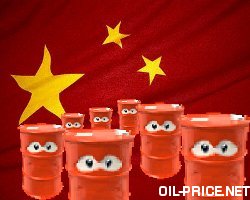At present, China is the fourth largest oil producer in the world
China, it seems, is everywhere. In what has become a routine, not a day passes without a mention of China in the news, in everyday conversations and predictions. As the next superpower, the country is wielding clout in every sphere possible. The growing influence is felt even in the oil market where the Asian giant is one of the biggest players.
Iraq's oil field is just emerging from the ravages of oil, but China is already there. PetroChina Co. has already got development projects for Halfaya and Rumaila Oilfield in Iraq. The company has also signed agreements for co-cooperation in the oil field with companies in Turkmenistan, Kazakhstan, Uzbekistan and Russia. Last year Chinese companies spent more than $32 billion to secure oil, metal, coal fields in Asia, Africa and Australia. The Chairman of PetroChina Co. has said that the company was planning to invest at least $60 billion for foreign acquisitions in the next decade.
Seemingly, at present, China is the fourth largest oil producer in the world. Last year oil output was put at 189.49 million tons, (3.79 million barrels a day) a fall by .04 percent than expected. According to the National bureau of statistics, China produced about 15.11 million tons of oil in the month of February. But, the country consumes oil many times more. As a result of which imports contribute to as high as 52 percent of the oil consumed.
Indeed, China became an oil importer only in 1993 but has come a long way since. China's oil imports could reach a record 210 million tonnes this year, up by 5.5 %. So how does China go about for energy? Let's see:
In one of the largest export deals for Australia, China National Offshore Oil Corp has decided to buy LNG from BG Group Plc's proposed export terminal in Queensland. Based on the deal signed, China would get 3.6 million metric tons of LNG yearly for the next twenty years from 2014. The deal is estimated to be worth more than $80 billion. Last August PetroChina Co. signed an agreement worth A$50 billion ($46 billion) with Exxon Mobil Corp. to buy 2.25 million tons of LNG with Chevron Corp.-led Gorgon LNG venture.
Of course, this is despite the tensions on the political front. One would remember the Rio Tinto trial where an Australian citizen and three of his colleagues were standing trial (since given 7-14 years of prison sentence) on charges of bribery and for infringing on commercial secrets. Anyway, the trial didn't stand in the way of growing trade relations with China. Also, PetroChina Co., and Royal Dutch Shell agreed to a $3.44 billion deal to buy most of the Australian assets of Arrow Energy Ltd., the coal seam gas producer.
"Australia's trading relationship with China is healthy and mutually beneficial" says Australian Energy Minister Martin Ferguson, "Australia is committed to strengthening that relationship and being an important partner in our region's economic growth."
In other deals, China's largest oil and gas producer, PetroChina Co., which holds about 7.5% stake in China Petroleum Finance decided to raise its holdings to 49%. The move made possible by buying stakes from the parent company China National Petroleum Corp. Thus, PetroChina Co. gets better returns on investment, as it gets finance quite easily.
